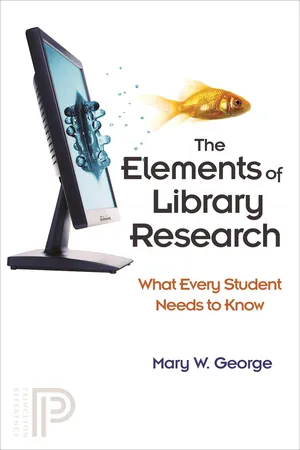
- 224 pages
- English
- ePUB (mobile friendly)
- Available on iOS & Android
About this book
To do solid academic research, college students need to look beyond the computer search engine. This short, practical book introduces students to the important components of the information-seeking process. The Elements of Library Research provides a foundation for success in any research assignment, from a freshman paper to a senior thesis.
Unlike guides that describe the research process but do not explain its logic, this book focuses entirely on basic concepts, strategies, tools, and tactics for research--in both electronic and print formats. Drawing on decades of experience with undergraduates, reference librarian Mary George arms students with the critical thinking skills and procedures they need to approach any academic project with confidence.
- Ways to turn a topic into a research question
- Techniques for effective online searches
- How to evaluate primary and secondary sources
- When and how to confer with reference librarians and faculty
- How to avoid plagiarism
- Glossary of key terms, from Boolean search to peer review
- Checklists, timelines, and hints for successful research projects
Frequently asked questions
- Essential is ideal for learners and professionals who enjoy exploring a wide range of subjects. Access the Essential Library with 800,000+ trusted titles and best-sellers across business, personal growth, and the humanities. Includes unlimited reading time and Standard Read Aloud voice.
- Complete: Perfect for advanced learners and researchers needing full, unrestricted access. Unlock 1.4M+ books across hundreds of subjects, including academic and specialized titles. The Complete Plan also includes advanced features like Premium Read Aloud and Research Assistant.
Please note we cannot support devices running on iOS 13 and Android 7 or earlier. Learn more about using the app.
Information
1

Introduction to Research as Inquiry
Moving from the Known to the New
Reasons for Research
- Reveal the cause or causes of a phenomenon
- Resolve an anomaly (something that doesn’t make sense)
- Test a hypothesis or develop a theory
- Verify or replicate someone else’s findings
- Determine what a new instrument or technique can do
- Adapt methods or results from one field to another
- Observe or record an event as it occurs
- Reproduce conditions from the past in the present
- Understand human motivations for actions
- Isolate factors and their interrelationships in a complex system
- Predict or influence individual or group behavior
- Improve the quality of life across cultures and populations
- Analyze the components of a creative work
Varieties of Research
Research Method | Characteristics and Examples |
Library | Involves identifying and locating sources that provide factual information or personal/expert opinion on a research question; necessary component of every other research method at some point |
Experimental | Takes place in a dedicated environment, typically a laboratory, and involves specific equipment and procedural steps; molecular biological research to decode a species’ genome is an example |
Explicatory | Entails a careful, close, and focused examination of a single major text, or of evidence surrounding a single complex event, in an attempt to understand one or more aspects of it—for instance, why a poem is pleasing, or the probable causes of an event |
Field | Occurs wherever the phenomenon under study exists, meaning the researcher goes to that location; archaeological excavation is one type |
Observational | Takes place either in a laboratory or in the field, but entails capturing an exact record of some behavior (of either animate or inanimate objects); child psychologists who watch infants interact do this sort of research. Note that researchers may be observers or participants in the phenomenon they are studying, as when an anthropologist lives in a remote village to record the language used by people during religious ceremonies |
Interview | Includes any sort of conversation that addresses a specific experience or issue about which the interviewee is knowledgeable, involves questions prepared in advance, and is recorded in its entirety; oral history, for instance |
Survey | Poses a series of questions to a group of people (usually a sample) with specific responses for individuals to choose from; usually captures demographic and socioeconomic information as well, to correlate with the responses; written questionnaires and telephone opinion polls are examples |
Longitudinal | Follows a phenomenon over time; often used in educational or medical studies where the individuals in a group are periodically reexamined at specific intervals over many years |
Archival | Involves the researcher in a close study of original documents—typically collected and retained by governments, organizations, or families—that exist in a unique location; genealogical research is a case in point |
Qualitative | Designates any research whose results are captured in words, images, or nonnumeric symbols; for instance, research on dreams |
Quantitative | Describes any approach where the phenomenon under study is captured via measurement and expressed in numbers that can be analyzed; opposite of qualitative research; econometric research on the international oil trade is an example |
Empirical | Refers to studies using experiment or observation to test the validity of a phenomenon; less rigorously, refers to knowledge derived from experience, as when people assert that, based on empirical evidence, the sun will rise tomorrow morning |
Theoretical | Entails speculation on the part of the researcher, and is usually based on the findings of other kinds of studies, in ... |
Table of contents
- Cover
- Title
- Copyright
- Contents
- Dedication
- Preface
- 1 Introduction to Research as Inquiry
- 2 From Research Assignment to Research Plan
- 3 Strategy and Tools for Discovery
- 4 The Fine Art of Finding Sources
- 5 Insight, Evaluation, Argument, and Beyond
- Appendix A: Good Habits, Helpful Hints, and Wrong Assumptions
- Appendix B: Mary’s Maxims Compiled
- Appendix C: Research Timelines
- Appendix D: Questions to Ask Your Instructor
- Appendix E: Research Appointment Worksheet
- Glossary of Library Research Terms
- Selected Bibliography
- Index